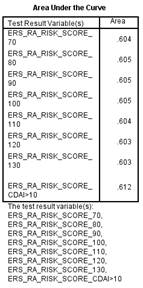Session Information
Session Type: ACR Poster Session A
Session Time: 9:00AM-11:00AM
Background/Purpose:
The most frequent cause of death in patients with chronic rheumatoid arthritis (RA) is of cardiovascular (CV) origin. CV risk prediction scores in the normal population do not predict the CV risk in RA patients adequately due to the additional systemic inflammatory burden which is pathogenic for CV disease. Recently, Solomon et al developed the ERS-RA Risk Score, a newly and expanded CV risk score predicting the 10 year CV event risk in RA patients. This is based on a cohort from the Consortium of Rheumatology Researchers of North America registry. In this abstract we present the results of a validation test performed with the ERS-RA Risk Score in the Dutch CARRÉ study.
Objective:
To perform a validation test of the ERS-RA Risk Score in the Dutch CARRÉ study.
Methods:
We validated the ERS-RA Risk Score in the CARRÉ cohort by performing a ROC curve analysis. The CARRÉ study is a Dutch cohort study investigating CVD and its risk factors in RA-patients who have been followed prospectively for at least five years. RA patients registered at Reade (location Jan van Breemen institute in Amsterdam, the Netherlands) participated if they fulfilled the 1987 ACR classification criteria , were diagnosed between 1989 and 2001, and were aged between 50 and 75 years. In contrast to the cohort used in study of Solomon et al, the CARRÉ study used the HAQ instead of the m-HAQ and the CARRÉ lacks the Predictor’s Global Assessment to calculate the CDAI. However, to proximate the true outcome of the m-HAQ and the CDAI we conducted the following modifications of the CARRÉ cohort data. To calculate the CDAI we estimated the Predictor’s Global Assessment as 70%, 80%, 100%, 110%, 120% and 130% of the Patient’s Global Assessment. Furthermore, we approximated the m-HAQ score 50% lower than the HAQ score as described in a recent published article.
Results:
The CARRÉ study included 352 RA patients with 60 CV events over a 10 year follow up period. The mean age was 63.3 years of which 121 (34%) male participants. The ROC curve analysis shows an area under the curve of 0.603-0.612 depending on the predicted Predictor’s Global Assessment (see figure 1).


Figure 1. ROC curve analyisis of the ERS-RA Risk score in the CARRÉ cohort with different approximated CDAI scores.
Conclusion:
In conclusion, the ERS-RA Risk Score has a limited validity in the CARRÉ study, a Dutch RA cohort and can therefore not be used for risk prediction in Dutch RA patients.
To cite this abstract in AMA style:
Baniaamam M, Nurmohamed M. Validation of the Ers-RA Risk Score in a Dutch Population [abstract]. Arthritis Rheumatol. 2018; 70 (suppl 9). https://acrabstracts.org/abstract/validation-of-the-ers-ra-risk-score-in-a-dutch-population/. Accessed .« Back to 2018 ACR/ARHP Annual Meeting
ACR Meeting Abstracts - https://acrabstracts.org/abstract/validation-of-the-ers-ra-risk-score-in-a-dutch-population/
